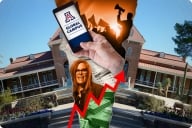You have /5 articles left.
Sign up for a free account or log in.
Adaptive learning is hot. The technology, loosely defined as data-driven tools that can help professors mold coursework around individual students’ abilities, is developing at a dizzying pace. And colleges have been hard-pressed to keep up with the mishmash of adaptive offerings from emerging firms.
The Bill & Melinda Gates Foundation is trying to lend a hand. Foundation representatives believe adaptive learning has plenty of potential, both to help more students earn a college credential and to do so more efficiently. So the foundation footed the bill to bring together leaders from a group of a dozen relatively tech-savvy colleges and two associations to share information.
Formed last May, the loose coalition ranges from the University of Texas at Austin to American Public University and the Kentucky Community and Technical College System. The group has met three times. One attendee calls it the most diverse gathering of institutions he’s seen in 40 years on the job. (See box below for a list of participating institutions.)
“We normally play in our own sandboxes,” said George Mehaffy, vice president of academic leadership and change at the American Association of State Colleges and Universities (AASCU), which was a participant.
Related to the group's work is a new report that tracks adaptive vendors and what their various offerings can and can’t do. Funded by Gates, the study released this week by Education Growth Advisors analyzed more than 70 adaptive learning companies with an eye toward helping college leaders decide which, if any, of those approaches might be worth adopting for their particular institution’s needs.
That’s no easy task, particularly in “emergent markets with considerable hype and limited transparency,” which the report said “certainly applies to the adaptive learning segment.”
Academic literature is also lacking on the technology, said Sharon van Wyk, executive vice president and chief operations officer of the American Public University System. “There hasn’t been a lot of structured research on it,” she said.
The study was shaped by the Gates-convened group. It includes a framework that seeks to define the potential of each approach, as well as an in-depth look at eight companies.
The goal of both the group’s meetings and the report are to help many officials across higher education get a better sense of adaptive learning, said Josh Jarrett, Gates's deputy director for education and postsecondary education.
“It’s this great opportunity, but in many cases still emerging,” he said. “We went into it with a deliberate lack of a clear destination.”
What and for Whom?
For a starting point, the report includes a stab at a definition.
“Adaptive learning takes a sophisticated, data-driven and in some cases, non-linear approach to instruction and remediation,” the report said, “adjusting to a learner’s interactions and demonstrated performance level and subsequently anticipating what types of content and resources learners’ need at a specific point in time to make progress.”
The technology varies widely, and can be used in different ways. So the report doesn’t attempt to rank offerings from adaptive learning firms. Rather, it seeks to explain what each one does, and how colleges might use those services.
Participants in Gates-convened Personalized Learning Network
- American Association of State Colleges and Universities
- American Public University System
- Arizona State University
- Association of Public and Land-Grant Universities
- Capella University
- Excelsior College
- Kaplan University
- Kentucky Community and Technical College System
- Rio Salado College
- Southern New Hampshire University
- SUNY Empire State College
- University of California at Berkeley
- University of Texas at Austin
- Western Governors University
For example, Cerego Global’s adaptive learning work is “fundamentally different” from what Knewton offers, according to the study.
Cerego, a company based in California and Japan, sports a cloud-based “memory management platform.” It emphasizes semantic memory and seeks to help users track their memory strength and decay on an item-by-item basis.
So far, Cerego has been focused on the consumer and corporate markets, particularly English language learners in Japan. But the company plans to soon pursue partnerships with colleges and to provide instructional services tied to massive open online courses, according the report. And Mehaffy said AASCU is working with Cerego.
Knewton, in contrast, has gotten plenty of attention for high-profile partnerships with Pearson and Arizona State University. The company’s adaptive platform can be used in both online and “blended” courses, drawing a large of amount of data to help instructors track their students’ performance in real time.
Mature and Sophisticated
While the report looks in-depth at eight adaptive firms, those write-ups are not endorsements. (Cerego got the full treatment while Knewton, arguably the best-known of the providers, did not.) Instead, it attempts to give an expansive overview of the adaptive market place. And, perhaps most importantly, it provides sets of attributes for assessing each approach.
That effort includes a chart for marking off the scale, scope and sophistication of adaptivity by each company, with each one falling somewhere on a continuum. It shows, for example, if the technology can be used as a study aid, supplemental instruction for a course, or as an entire course.
The study also tried to address the maturity of each firm, including the support and maintenance they provide.
Over all, the report gives a good breakdown of the industry, said Robert (Bob) Clougherty, acting vice provost for research, innovation and open education at Empire State College, which is part of the State University of New York. And Clougherty, whose institution was a participant in the group, said a broad range of colleges should be able to use it.
“Each of us is going to help our students in our own way,” he said. “We’re going to have different needs.”
The Gates Foundation also last month announced a $100,000 grant aimed at U.S. colleges, which seeks to help them create partnerships to launch adaptive courses. That grant is part of the foundation’s broader exploration of whether boundaries to the wider adoption of the technology can be overcome. Rahim Rajan, a program officer at the foundation, has played a primary role in the work.
Several participants in the Gates-convened group applauded the foundation for its approach to the meetings. That sort of knowledge sharing across sectors never would have happened without Gates, they said. And many hope to keep the new lines of communication open as the adaptive learning industry continues to develop.
“It’s a bewildering landscape,” said Mehaffy. “But at the same time it’s so exciting.”









